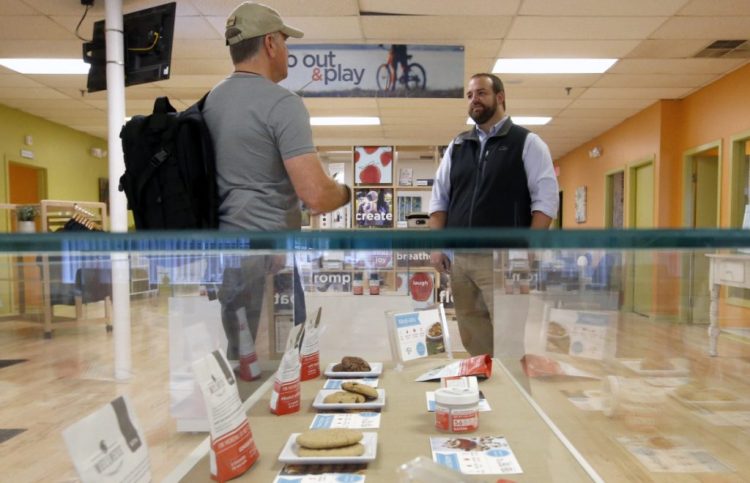A consultant is expected to submit a first draft of proposed adult-use marijuana rules to the state Office of Marijuana Policy on Thursday, putting Maine back on track to open its recreational market by year’s end, state officials say.
“We are working incredibly hard to get this thing rolled out,” said Erik Gundersen, director of the new Office of Marijuana Policy, on Wednesday. “There are people in my office that are working, no lie, seven days a week to make sure we can get this adult-use industry rolled out in 2019.”
The Colorado consulting firm Freedman & Koski was tapped in February to write rules governing how Maine will license and regulate its adult-use market. The regulations will codify the legislative rewrite of a 2016 legalization referendum and flesh out areas that lawmakers left to rulemaking.
To launch in 2019, the Office of Marijuana Policy must shop its draft rules around to key state agencies, including agriculture, labor and public safety, for review and revision before referral to lawmakers in May for a legislative vote that must be held before the session ends in June.
“To us, that’s the ball game,” Gundersen said of rulemaking. “Anybody who is familiar with the speed at which state government works knows that is more or less impossible, but we have timelines … we are set to actually deliver on. That is our goal. There are many roadblocks, but we are doing our best.”
The Maine Department of Administrative and Financial Services, which oversees Gundersen’s office, will not release the draft rules to the public until they are reviewed by state agencies and finalized, said spokesman David Heidrich. He called it a “matter of standard practice.” The Press Herald is challenging that action.
The state is working with Freedman & Koski to draft rules even though a rival bidder, BOTEC Corp. of Los Angeles, had appealed the award. The state canceled an appeals hearing last week, saying the two parties were working to resolve their differences. Gundersen refused to say more Wednesday.
In December, Maine gave the consulting contract to BOTEC for $199,000. Freedman & Koski appealed that award, claiming the state had unfairly scored the applications and failed to give it credit for using a local law firm, and the state canceled its deal with BOTEC in January.
The consultant kerfuffle is one of many stumbling blocks that have delayed the full implementation of a recreational program that voters approved at referendum in 2016. Residents can now grow cannabis for recreational use at home, but still have no way to legally buy or sell it.
Other delays included two legislative rewrites of the original referendum question, repeated vetoes and then inaction by former Gov. Paul LePage, a vocal marijuana opponent, and the state’s decision to kill a deal last month with the nation’s largest consultant that provides cannabis tracking software because of bidding concerns.
On Wednesday, however, when speaking to a group of cannabis lawyers, lobbyists and entrepreneurs at an information session hosted by Preti Flaherty law firm of Portland, Gundersen emphasized how hard the 2-month-old Office of Marijuana Policy was working to get the program back on track.
For example, the state solicited new track-and-trace proposals just a week after canceling its initial deal.
This track-and-trace program is the state’s primary tool for monitoring compliance with adult-use laws, following every plant through the regulated marketplace from its start as a clone at one of Maine’s state-licensed grows to its final sale as smokable flower, oil or edible.
It is designed to prevent regulated marijuana and tax revenues from being lost to the black market.
Six applicants responded to the state’s latest track-and-trace solicitation by the Wednesday deadline – BioTrackTHC, Dauntless, METRC, MJ Freeway, BioMauris and VisualVault. METRC was the company that Maine originally selected to track its medical and recreational marijuana programs.
The proposals will be evaluated by a state review team before the administrative services department announces its pick, Heidrich said.
During a 15-minute presentation Wednesday, Gundersen noted other Office of Marijuana Policy work: hiring 43 adult-use and medical program workers; launching a new data collection project; developing public health and safety campaigns; and developing a law enforcement training program.
“We do realize people have been waiting a very long time,” Gundersen told the audience. “Be patient with us. The Office of Marijuana Policy is only 8 weeks old, but we are moving at breakneck speed. We are trying to do it right, as well.”
Penelope Overton can be contacted at 791-6463 or at:
poverton@pressherald.com
Twitter: @PLOvertonPPH
This story was updated at 3 p.m. April 11 to include a sixth bidder on the state’s marijuana tracking contract. The company was inadvertently omitted from information provided by the Office of Marijuana Policy.
Send questions/comments to the editors.


